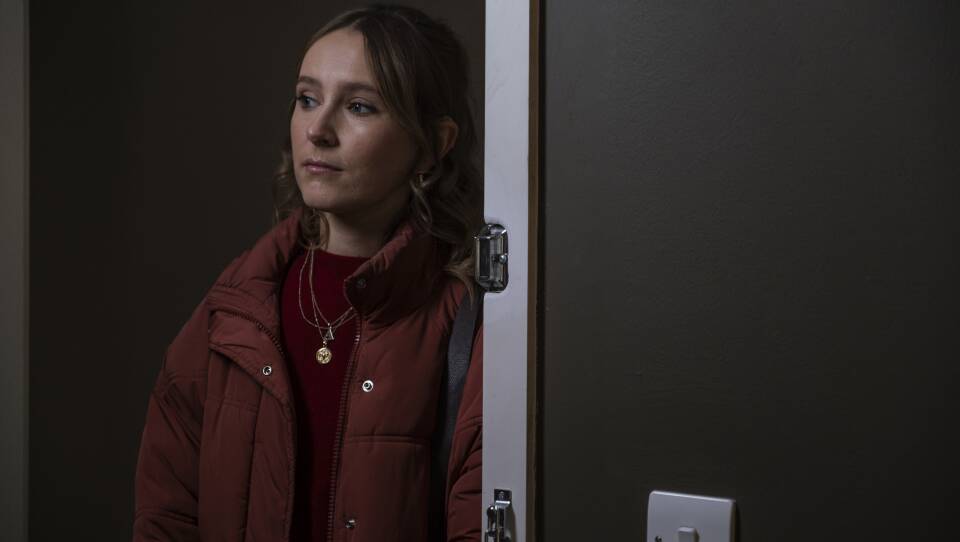This article contains spoilers for Patience’s season 1 finale, Code of Silence episodes 1 and 2, and teasers of future Code of Silence episodes.
Patience — starring Ella Maisy Purvis — concluded its first season on PBS on Sunday with the title character facing the dual fears of anthrax exposure and the possibility of going on a first date. Once again, her skills in pattern detection and a desire to go beyond her actual job title in the forensics department help the police to make critical arrests. Throughout the season, not only is Patience shown as an autistic woman with a life outside of work, but the show has also heavily featured characters with other forms of neurodivergence and a wide range of physical disabilities.
The good news for Patience fans is that UK Channel 4 has already given Season 2 the green light. The bad news is that it won’t premiere on PBS for at least a year. In the meantime, BritBox’s Code of Silence mixes some of the best elements of Patience with a hint of the thriller genre. UK ITV has renewed Code of Silence for a second season, but has not yet finalized US release details.
Code of Silence follows a young deaf woman named Alison Brooks (Rose Ayling-Ellis) who works in the police station cafeteria. She’s a lip reader, but doesn’t have any formal training or certifications, having learned the skill from her mum (Fifi Garfield), who is also deaf. One day Alison is called upstairs by DI Ashleigh Francis (Charlotte Ritchie) to lip read surveillance tapes on a gang of thieves planning to steal jewelry worth millions. Alison’s read leads police to figure out key details of the gang’s planning and who else is involved. Alison also goes beyond her initial assignment to start tracking Liam (Kieron Moore), a suspect who is close in age to her, in her free time.
GBH Drama interviewed lead actor and Executive Producer Rose Ayling-Ellis and Executive Producer and screenwriter Catherine Moulton to find out how disability and accessibility were incorporated into all aspects of production, and how they developed the core mystery.
GBH Drama: How did your own lives inform the way you wrote, developed, and acted the character of Alison?
Catherine Moulton: I came up with the idea because I’ve been partially deaf since childhood, and I picked up lip-reading quite instinctively, but I didn’t have lessons until a couple of years ago. That’s when I kind of started to understand more of the theory of lip-reading, exactly how much work you’re doing when you’re lip-reading, because about 30 to 40 percent of speech is visible on your lips, and the rest of it is complicated guesswork. You are looking at facial expressions, body language, and the context that you are in — what you know about the person — and you’re putting it all together like a big puzzle. It just made me realize that lip readers are detectives, really. That made me just think that there should be a crime show with a lip-reader as the main investigative character. It felt perfect. I hadn’t even written the script at that point when Rose came on board. We developed it together.
Rose Ayling-Ellis: l love acting so much. I started acting about 14 years ago. It took me a long time to get to the point where I can be a lead role in a show, and that’s so exciting. Catherine approached me two years ago, I read the outline, and then it was talking about lip-reading. At first I thought, ‘oh no, it is about lip-reading,’ because there’s so much misconception that lip-reading is like reading a book; you can understand it all. What drew my attention is that Catherine wrote it down as a puzzle. At the start, you can’t work it out, and then you are working it out, and then you eventually form a sentence. Then I said yes, I’m doing that role. You can always tell when someone has written a script that they’ve had the experience of being deaf or understanding of the culture, because not everyone has had that. Sometimes you can immediately tell if someone writes something, they are hearing. You know what I mean?
GBH Drama: Rose, you’re an executive producer on this project, as well as an actress. What was that experience like?
Rose Ayling-Ellis: I didn’t do it because of the fancy title. I have been doing all of this extra work as a deaf person with every production I’ve been in for the last 14 years. It’s nice that I get the credit and respect this time for all the extra work I do. I was involved before, during, and after filming. I looked over the script, and changed anything I felt I wanted to change. I also spent time in the editing room. I’ve received a lot of feedback on my subtitles, particularly the lip-reading part. Additionally, I was able to provide feedback on how to make the set accessible, including what the crew is like, and suggested bringing in my network of deaf individuals who work in film and TV.
GBH Drama: To follow up, can you describe the logistics of production, and what made Code of Silence different than other mysteries and police procedurals?
Catherine Moulton: It happened quite naturally, because we set out from the beginning to build it that way. Rose and I are Execs. Briony Arnold, one of the other execs, is a wheelchair user. We decided from the start that it was going to be an accessible set, and we wanted to make it feel very welcoming. In a way, though there was some work involved in it, it wasn’t that hard. We didn’t have to reinvent everything. We had to change a few things. We had someone who’s visually impaired in the costume department, so we had easy-to-read call sheets. The little changes make a big difference.
Rose Ayling-Ellis: Yeah, we had color-coded names on each dressing room door, so she can see which actor was in the room.
Catherine Moulton: These were not expensive changes, but it did make a real difference to the feel of the set. Everybody took the time to make sure that the person you’re speaking to had understood what you’re saying. And little changes made such a difference, because it was a very happy and inclusive set.
Rose Ayling-Ellis: What’s really important is that it wouldn’t disrupt the set to help the disabled people, and the deaf, and neurodiverse. It helped everybody out. It helped the whole crew, because the camera crew, one cameraman, while we were filming, he can’t speak, because it made noise. So he learned sign language, a little bit of sign language. So it’s actually a benefit for everyone, and it’s not just “oh, an expensive thing that just helps only very few people.” No, it helps everybody, and it makes it such a lovely environment where everyone really takes care of each other and really sees each other.
GBH Drama: How did you balance the storytelling and also acting, giving Alison the case and developing the case, and giving Alison a full life outside of her work?
Catherine Moulton: I always wanted to make sure that this was Alison’s story and that she’s the protagonist, because it would be easy for it to become more about the police officers or more about the criminals. Putting her at the heart of it and giving her dilemmas, like she wants to do right by her job with the police, but then, as she gets to know Liam, one of the suspects, she sees things in him that make her think that he’s not as bad as she thought he was. This puts her in a place where she’s constantly being torn in two different directions and having to make big choices.
Rose Ayling-Ellis: It makes sense why Alison is taking things too far. She’s determined to show everyone she’s so much more capable than what people put on her. Alison’s not getting involved in the case to save the day and save everybody and be your superhero. It’s selfish and reckless, but she’s determined to prove she can do this. Even when I watch it, and even when I was acting it, I felt like, “yeah, it makes sense.” But watching it, it’s quite funny that I eventually found Alison a bit annoying.
GBH Drama: Alison has both an ex who wants to get back together and someone she’s met on the rebound. How important was it to show Alison as romantically desirable?
Catherine Moulton: It goes back to that thing of wanting to show Alison as a fully-rounded woman who has a love life like any young woman. Showing a three-dimensional deaf woman who has romantic choices felt important, because quite often we’ve all seen deaf and disabled characters presented as being quite one-dimensional. I wanted any young woman to recognize things about their own lives in Alison’s story.
Rose Ayling-Ellis: I completely agree, because it adds layers to Alison. She’s also a woman. She’s also happy. She also makes mistakes. She doesn’t always end up being right, but she is also a lot more capable. That excites me so much. Most actors get to play characters with so many layers, and I’m like, “oh, I wish I’d get to do that,” instead of a deaf girl who stepped on a road and got run over. It’s so nice to play much more than that.
GBH Drama: Which scenes were the hardest to write or act?
Catherine Moulton: The hardest thing to write was making sure that the clues to the crime show could emerge through lip-reading. That took a lot of, “exactly what word do we have to see here that you understand the clue? What’s the thing that takes you to the next stage of the crime show?” But getting that through lip-reading was quite hard. It was always the crime aspect, for me, that we worked on the most.
Rose Ayling-Ellis: For me, the harder bit was acting in the moment when I have to lip-read someone or something. Quite often, because the camera was close up to the actor, you can’t see what’s going on. I struggled to look across at the actor, and someone was talking through that. I can’t lip-read them. I don’t know what they’re saying. I have to have somebody behind the camera to act the scene, so I can feel like I’m reacting to something. I struggle to act when nothing’s there.
The first two episodes of Code of Silence are currently streaming on BritBox, and the remaining episodes will be released on Thursdays.





